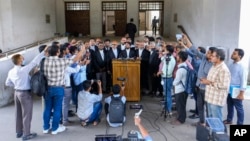The Bangladeshi interim government has overturned a ban on a controversial religious-based political party, adding an element of uncertainty to the country's prospects as it moves toward new elections following the ouster of Prime Minister Sheikh Hasina.
Jamaat-e-Islami and its affiliate Islami Chhatra Shibir had been banned on August 1 amid countrywide protests that led to the ouster of Hasina and her ruling Awami League party four days later. But the interim government announced the lifting of the ban in an official bulletin Wednesday, saying there wasn't evidence connecting the parties to terrorism or violence.
Jamaat Secretary-General Mia Ghulam Parwar welcomed the decision in an interview with Voice of America's Bangla Service, saying the original ban was "illegal, as it was initiated by an illegal government."
"We made a demand to the present interim government to revoke it. ... The government did justice by resisting a tyranny. I thank God Almighty for this," Parwar said.
When asked about participation in new elections now being organized by an interim government, Parwar said, "Jamaat is an election-oriented party. If the election is acceptable to all, we will participate in that election, inshallah."
Mirza Fakhrul Islam Alamgir, secretary-general of the Bangladesh Nationalist Party (BNP), which was the largest opposition party during Hasina's rule, also welcomed the decision to lift the ban.
"Jamaat is a political party. I think it was not right to ban them," he told VOA. "They have been in politics for a long time. They were represented in the parliament. Therefore, the decision to revoke the banning of Jamaat-Shibir is correct."
Different takes
Political analyst Badiul Alam Majumdar, founder of the civil society organization Citizens for Good Governance, told VOA he believed the decision was "logical" because the party had been banned by the Awami League government "as a strategy to suppress and counter the movement."
"The more political parties there are in the country, the better," Majumdar added. "Political parties can be banned for several reasons. Impeachment should be done for logical reasons, not as political maneuvering. I think reverting the decision to ban Jamaat is a right one."
Critics of Jamaat-e-Islami, however, worry that re-legalizing the party will undermine efforts to move the country forward.
"Although the rehabilitation of Jamaat is unexpected, this decision of the interim government did not surprise me," said Imran H. Sarker, spokesperson for the Gonojagoron Moncho human rights movement.
"This is not an isolated incident. The whole process is part of a long process of turning Bangladesh into a communal, failed and dysfunctional state."
Gonojagoron Moncho led a movement in 2013 demanding justice against those who committed atrocities during the country's war for independence from Pakistan in 1971. As a result, some leaders of Jamaat who had been active in the party leadership in 1971 were charged with crimes under a 1973 law, the International Crimes (Tribunals) Act.
American political observer Adam Pitman wrote in an opinion piece, "Jamaat had a decade to put itself on the right side of the law. Jamaat had a judgment they could have used as a self-help guide: Disavow communal politics; place women in leadership positions; commit to a secular, democratic system of government. They chose not to.”
Jamaat-e-Islami history
Once an ally of the BNP, Jamaat-e-Islami reached new highs politically in the 1991 general elections, helping then-BNP leader Khaleda Zia to become the first female prime minister of Bangladesh.
But their coalition lost favor because of a series of terrorist attacks, poor governance and corruption, leading to a sharp decline in Jamaat's representation in the 2008 elections.
To present a more nationalist image, Jamaat has separated itself from its counterparts in Pakistan and India. However, there is still an acceptance struggle going on in Bangladesh because of the party's cooperation with the Pakistani army during the 1971 Bangladesh Liberation War.
Jamaat was restricted from participating in elections by the Election Commission in 2013 after it was deregistered. That came after the Awami League administration established the International Crimes Tribunal, which tried and convicted several senior Jamaat officials of war crimes during the 1971 conflict.
Jamaat has remained quiet and focused on religious activities while maintaining its organizational structure, even after much of its leadership was lost to executions and convictions.
Foreign governments, especially Pakistan and Turkey, have expressed sympathy for Jamaat, creating diplomatic tensions with the now-deposed Hasina government.
Majumdar suggests that lifting the ban on Jamaat-e-Islami alone won't shape Bangladesh's political future, but he acknowledges that religion may play a role.
"Time will tell what kind of impact this decision will have on future politics," he said. "Where will people's support go? However, it is true that we are gradually becoming religious due to which the public support of such political parties may increase."
This story originated in VOA's Bangla Service.
